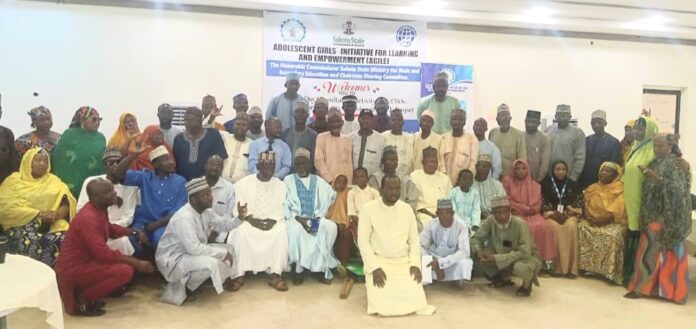Dr Mansur Buhari, Project Coordinator, Adolescent Girls Initiative for Learning and Empowerment (AGILE) in Sokoto State, has advocated for support to inclusive education policy in the state.
The coordinator made the call at the closing of a 2-day workshop for stakeholders held in Sokoto on Friday.
Newsmen reports that the workshop was organised to obtain direct inputs and recommendations from stakeholders towards improving the inclusive education system.
Buhari, represented by Mr Mamuda Galadima, charged Civil Society Organisations (CSOs) and Non Governmental Organisations (NGOs) to support the implemention of the policy for the good of the society and the state at large.
“The effort is to strengthen and facilitate implementation of the project that seeks to integrate normal and physically challenged students to access education and other empowerment under one roof.
“Domesticating concept of inclusive education policy in the AGILE project will deepen understanding of the activities needed on the existing structures so as to utilise it for the success of the programme,” he said.
In a related development, the coordinator observed that success of AGILE project would rely solely on quality data coordination.
Buhari disclosed this during the training of Data Enumerators for the 23 Local Government Areas of the state held in Sokoto on Friday.
Represented by Hajia Lami Muktar, the coordinator said, effective use of data and its associated solutions would help in tackling many problems in the country.
According to him, quality data, when utilised accurately, produces positive impacts which results in effectiveness and efficiency, thereby leading to citizen satisfaction.
“Quality data will help in making effective and implementable policies. Data alone are not sufficient, but data are key to assessing the performance of any policy made,” he said.
In her presentation, the Head of Department, Special Education in Shehu Shagari College of Education, Sokoto, Mrs Maryam Shehu, said: “Inclusive education is a global issue that raised concerns until the Spain declaration in 1994.”
Shehu explained that AGILE project encouraged the emergence of more talents among students, advising that the successive impact needed to be sustained by critical stakeholders.
She stressed the need for policy implementation framework and laws to be put in place for the physically challenged persons to access education with ease.
”Our schools should be well equipped with relevant structures, teaching aids and modern gadgets that will bridge the gap for physically challenged persons to be adequately served,” she advised.
Malam Hudu Shehu, the Vice Principal of Adisa Raji Special School, dwelled on the contents of inclusive education policy learning categories and the enacted disability law in Sokoto state.
Shehu, who is a virtually impaired person and beneficiary of special education support enjoined stakeholders to support physically challenged children to acquire education at all levels towards ensuring productive engagement in their lives.
The Executive Secretary, Sokoto State Female Education Board, Prof. Mustapha Tukur-Namakka, assured the board’s readiness to facilitate a strategic and comprehensive approach for stakeholders’ engagement to ensure successful implementation of AGILE project in the state.
”We have already developed a framework to ensure collective commitment of MDAs, CSOs and NGOs, including parent associations to promote and encourage inclusive education across the state,” he said.




